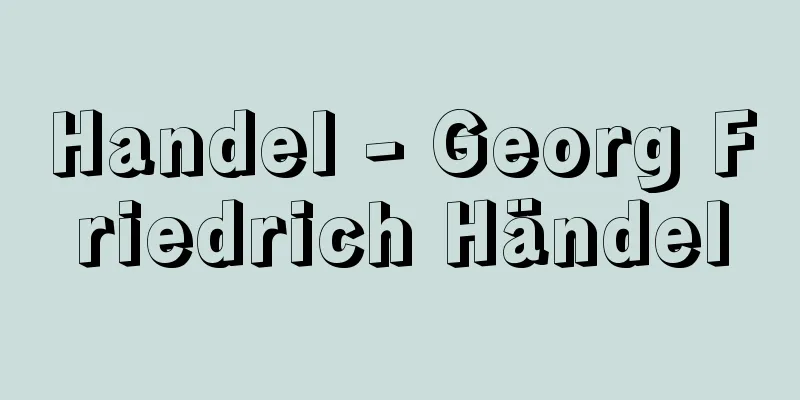Handel - Georg Friedrich Händel

|
Along with Bach, he is one of the most representative composers of German Baroque music. He was born on February 23rd in Halle on the Saale River in central Germany. His father was a surgeon to the court of Saxony-Weissenfels, and was against Handel becoming a musician. However, after hearing his excellent organ playing, Duke August of Weissenfels recognized his talent and allowed him to study under Zachau, organist at St. Mary's Church in Halle. In 1702, he entered the law department at the University of Halle, but also began working as an organist there, and around that time he began his lifelong friendship with Telemann. In 1703, he went to Hamburg. The opera house at Gänsemarkt (Goose Market) was flourishing under the Kaiser's guidance, but Handel gained practical experience as a violinist and harpsichordist before performing works such as Almira (1705). He also became friends with Mattheson around this time, and in 1703 the two visited Buxtehude in Lübeck. Handel probably went to Italy at the end of 1706. Upon arriving in Rome, his talent was immediately welcomed by the nobles, including the Marquis of Ruspoli. In April 1708, 45 musicians led by Corelli performed the oratorio "Resurrection" at the Ruspoli residence, and 1,500 copies of the lyrics were printed. In June and July of the same year, Handel visited Naples, where he performed the dramatic cantata "Archi, Galatea and Polyphemo" for Duke Alvito, and from the end of 1709, he gave 27 performances of the opera "Agrippina" in Venice, which was a great success. During his time in Italy, he formed close friendships with Corelli and the father and son Scarlatti, who greatly influenced him musically. Having achieved fame in Italy, Handel returned to Germany in 1710 when he was appointed Kapellmeister at the court of Hanover, succeeding Steffani, but later that year he took a leave of absence to go to London, where his opera Rinaldo, performed at the Queen's Theatre in 1711, was a great success, and he established England as his base of operations, writing operas such as The Faithful Shepherd (1712) and Teseo (1713). Queen Anne died in August 1714, and in September, Elector George Ludwig of Hanover ascended to the throne as King George I of England. On July 17, 1717, Water Music was performed for the King's boating trip on the River Thames. In 1719, Handel's career entered a new phase with the establishment of the Royal Academy of Music, an opera company based at the King's Theatre in Haymarket. This marked the peak of his operatic career, with works such as Ottone (1723) and Julius Caesar (1724). However, the Academy suffered a major blow when The Beggar's Opera, with a libretto by Gay and music by Pepusch, was a huge success at Lincoln's in Fields in 1728. The Beggar's Opera was a satire of the Academy's operas, targeting political corruption and courtiers, and parodying Handel's music. Handel, who had already been appointed Composer of the Royal Chapel in 1723, made a great impression in 1727 when he composed a large-scale "Coronation Anthem" for the coronation of George II, who ascended to the throne after the death of George I. He also received British citizenship on February 20, 1727, just before the death of George I. In 1729, the Academy was re-established, and Handel travelled to Venice and Rome to recruit singers, visiting his mother in Halle on the way back. He achieved success at the re-established Academy with operas such as Polo (1731), but in 1733 the Academy found itself in difficulty again when a new rival group appeared: the "Noble Opera" based at Lincoln's-in-Fields Theatre. Composers of this group that competed with Handel included Bononcini and Porpora, and later Hasse became its musical director. Around this time, Handel moved his base to the newly renovated Covent Garden Theatre, and competed with operas such as Alcina (1735) and oratorios such as Alexander's Feast (1736), but in the end both companies were forced to suffer the tragic collapse of their respective companies. However, around this time, the custom of Handel himself playing solo organ concertos between the acts of the oratorios became established and gained popularity. In April 1737, Handel suffered a stroke that left him partially paralyzed, and he spent the summer in Aachen for hot spring treatments. However, after a miraculous recovery, he returned to London and demonstrated his strength by performing the Funeral Anthem for the funeral of Queen Caroline in December. The following year, in 1738, he performed the operas Pharamonde and Xerxes at the King's Theatre under Heidegger, but both were unsuccessful. Under these circumstances, Handel's focus gradually shifted to the field of oratorios. Thus, in 1739, oratorios such as Saul, Israel in Egypt, and Ode for St. Cecilia's Day were premiered, but they were not successful. Handel's greatest work was the oratorio Messiah. Commissioned by the Lord Lieutenant of Ireland in August 1741, it was completed in just 24 days and premiered in Dublin on April 13, 1742, where it was a great success. Encouraged by this, he performed masterpieces such as Belshazzar (1745) and Judas Maccabaeus (1748), and succeeded in winning the support of the British middle class, which was forming as a result of the Industrial Revolution at the time. In addition, Music for the Royal Fireworks was performed on April 27, 1749, to celebrate the signing of the peace treaty in Aachen, the British victory in the War of the Austrian Succession. In 1753 he became completely blind due to cataracts, but he continued to be active as a conductor and organist, and continued to compose from dictation until his final oratorio, The Triumph of Time and Truth, which premiered in March 1757. He sadly died in London on 14 April 1759, and was buried in Westminster Abbey in accordance with his will. [Ryuichi Higuchi] "Handel" by Keiichiro Watanabe (1966, Ongaku No Tomosha)" ▽ "Handel" by S. Sadie, translated by Kyoko Murahara (1975, Zen-On Music Publishers)" [References] | |Source: Shogakukan Encyclopedia Nipponica About Encyclopedia Nipponica Information | Legend |
|
バッハとともにドイツのバロック音楽を代表する作曲家。2月23日、中部ドイツ、ザーレ河畔のハレで生まれる。父はザクセン・ワイセンフェルス宮廷付外科医で、ヘンデルが音楽家になることに反対だったが、彼の優れたオルガン演奏を聴いたワイセンフェルス公アウグストに認められ、ハレの聖マリア教会オルガン奏者ツァハウのもとで学ぶことを許された。1702年ハレ大学法科に入学するが、同地でオルガン奏者としての仕事も始めており、そのころテレマンとの生涯に及ぶ交遊も始まっている。1703年ハンブルクに赴く。ゲンゼマルクト(鵞鳥(がちょう)市場)のオペラ劇場は、カイザーの指導下に隆盛を極めていたが、ヘンデルはバイオリン奏者、チェンバロ奏者として実地の経験を積んだのち『アルミーラ』(1705)などの作品を上演した。またこのころマッテゾンとも親交を結び、1703年にはともにリューベックのブクステフーデを訪れている。 おそらく1706年末、ヘンデルはイタリアに赴いた。彼の才能は、ローマに着くとすぐさまルスポリ侯爵家をはじめとする貴族たちに喜んで受け入れられた。1708年4月ルスポリ家におけるオラトリオ『復活』の上演には、コレッリの率いる45人の奏者が参加し、1500部の歌詞本が印刷されている。同年6~7月ヘンデルはナポリを訪れ、アルビート公のために劇的カンタータ『アーチとガラテアとポリフェーモ』を上演、1709年末からはベネチアでオペラ『アグリッピーナ』を27回も上演し、大成功を博している。イタリア時代、彼はコレッリやスカルラッティ父子とも親交を結び、音楽的にも大きな影響を受けた。 イタリアで名声をあげたヘンデルは、1710年ステッファニの後任としてハノーバー宮廷楽長に就任、ドイツに帰るが、その年のうちには休暇を得てロンドンに向かい、1711年クイーンズ・シアター上演のオペラ『リナルド』が大成功を収め、イギリスを活動の本拠とすることになる。こうして『忠実な羊飼い』(1712)、『テセオ』(1713)などのオペラが書かれた。 1714年8月、アン女王が世を去り、9月にはハノーバー選帝侯ゲオルク・ルートウィヒがイギリス王ジョージ1世として即位した。1717年7月17日、テムズ川での王の船遊びのために上演されたものが『水上の音楽』である。1719年、ヘイマーケットのキングズ劇場を本拠とするロイヤル音楽アカデミーというオペラ団体の設立で、ヘンデルの活動は新段階に入る。『オットーネ』(1723)、『ジュリアス・シーザー』(1724)をはじめ彼のオペラ創作の最盛期を迎えるのである。しかし1728年、ゲイの台本とペプシュの作曲による『乞食(こじき)オペラ』がリンカンズ・イン・フィールズ劇場で大成功を収めると、アカデミーは大打撃を受けることになる。『乞食オペラ』の内容はアカデミーのオペラを皮肉り、政治の腐敗や宮廷人を槍玉(やりだま)にあげた風刺的なもので、ヘンデルの音楽もパロディー化された。なお、すでに1723年に王室礼拝堂作曲家に任じられていたヘンデルは、1727年、ジョージ1世の死後即位したジョージ2世の戴冠(たいかん)式のために大規模な『戴冠式アンセム』を上演し深い感銘を与えている。彼はまた、ジョージ1世の死の直前の1727年2月20日、イギリス国籍を獲得している。 1729年アカデミーの再建が図られ、ヘンデルは歌手獲得のためにベネチアとローマに旅したが、帰路ハレに母を訪ねている。再建されたアカデミーで彼はオペラ『ポーロ』(1731)などで成功を収めたが、1733年にはふたたび新たな対抗団体が出現し、アカデミーは苦境に陥った。リンカンズ・イン・フィールズ劇場を本拠とする「貴族オペラ」という団体である。ヘンデルに対抗するこの団体の作曲家はボノンチーニとポルポラ、さらにのちにはハッセが音楽監督となった。 ヘンデルはこのころから本拠を新装なったコベント・ガーデン劇場に移し、『アルチーナ』(1735)などのオペラや『アレクサンダーの饗宴(きょうえん)』(1736)などのオラトリオの上演で対抗したが、結局両団体とも共倒れの悲哀をなめざるをえなかった。ただ、このころ、オラトリオの幕間にヘンデル自身の独奏によるオルガン協奏曲を演奏する習慣が定着し、人気を博した。 1737年4月、卒中に襲われ半身不随となったヘンデルは、温泉治療のためアーヘンで夏を過ごした。しかし奇跡の回復ののちロンドンに帰った彼は、12月にはキャロライン王妃の葬儀のための『葬送アンセム』上演で健在ぶりを示し、翌1738年、ハイデッガーが率いるキングズ劇場でオペラ『ファラモンド』『クセルクセス』を上演するが、いずれも不成功に終わった。こうした状況のもとに、ヘンデルの活動の重心はしだいにオラトリオの分野に移っていった。こうして1739年には『サウル』『エジプトのイスラエル人』『聖セシリアの日のための頌歌(しょうか)』などのオラトリオが初演されたが、成功には至らなかった。 ヘンデル起死回生の一作となったのがオラトリオ『メサイア』である。1741年8月にアイルランド総督の依頼を受け、わずか24日で完成されたこの作品は、翌1742年4月13日ダブリンで初演され大成功を収めた。これに勢いを得た彼は、『ベルシャザール』(1745)、『ユダス・マカベウス』(1748)などの名作オラトリオを上演し、おりから産業革命の結果形成されつつあったイギリスの中産階級の支持を受けることに成功した。またオーストリア継承戦争に勝利したイギリスが、アーヘンでの平和条約締結を祝う1749年4月27日の記念祝典に上演されたのが『王宮の花火の音楽』である。 1753年には白そこひ(白内障)のため完全に失明するが、以後も指揮やオルガン演奏に活躍し、1757年3月初演の最後のオラトリオ『時と真理の勝利』に至るまで口述で作曲も続けたが、1759年4月14日、ロンドンで惜しくも世を去り、遺言に基づいてウェストミンスター寺院に埋葬された。 [樋口隆一] 『渡部恵一郎著『ヘンデル』(1966・音楽之友社)』▽『S・サディー著、村原京子訳『ヘンデル』(1975・全音楽譜出版社)』 [参照項目] | |出典 小学館 日本大百科全書(ニッポニカ)日本大百科全書(ニッポニカ)について 情報 | 凡例 |
Recommend
Aswan High Dam
A rock-fill dam located about 900 km upstream from...
Indirect possession
Please see the "Proxy Possession" page....
Nuri (English spelling)
The inhabitants of the central highlands, the Haz...
Vallhagar
...It has been inhabited since very early times a...
Edo Culture
...The period following the Azuchi-Momoyama perio...
Santi di Tito (English spelling)
…This period (1580-90) is considered the rise of ...
Kasari [town] - Kasari
An old town at the northern tip of Amami Oshima, O...
Dielectric breakdown
When voltage is applied to an insulator, only a v...
Daguerre (English spelling) Louis Jacques Mandé Daguerre
French painter and impresario known as the invent...
Senkere
…A ruined city located about 15 km southeast of U...
Hard boiled - Hard boiled
A realist style that appeared in American literat...
Bleaching - Hyohaku (English spelling)
Bleaching refers to the process of chemically brea...
Crespi, GB (English)
…Italian painter. His real name was Giovanni Batt...
"The junge Hegel" (English spelling)
…After the Nazis came to power in 1933, he fled t...
World Confederation of Organizations of the Teaching Profession
In addition, the Federation of Arab Teachers (FAT...









